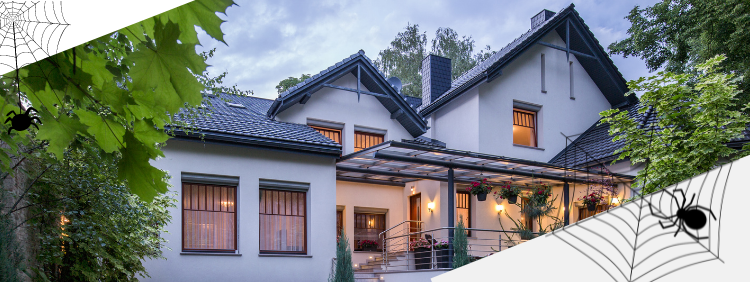 Spiders can be a helpful addition to the exterior of your home if you're not concerned about the creepy-crawly eight-legged arachnids moving around at their leisure. However, there can be too much of a good thing. A spider infestation is not ideal for managing your bug problem, and decreasing your overall pest population is the most sensible way to handle the situation. Spider pest control in Cambridge can help manage outdoor pest control so that you can enjoy your outdoor space without worrying about infestations.
Spiders can be a helpful addition to the exterior of your home if you're not concerned about the creepy-crawly eight-legged arachnids moving around at their leisure. However, there can be too much of a good thing. A spider infestation is not ideal for managing your bug problem, and decreasing your overall pest population is the most sensible way to handle the situation. Spider pest control in Cambridge can help manage outdoor pest control so that you can enjoy your outdoor space without worrying about infestations.
Spiders Follow the Food
Remember that wherever there’s food, spiders will follow. When it rains and bugs run for shelter inside your home, spiders head right in after them. When bugs fly close to the floodlights at night, spiders make their webs across the corners of the eaves beside them to catch the flying snacks that pass by. Nowadays, many lights have filters that can reduce overall bug attraction, so that mass amounts of spiders are less likely to set up shop, catching winged drifters. Regularly clearing corners and doorways will also help reduce recurring webs.Indoor Spider Control
Fruit flies and gnats are annoying. If you’re talking and a gnat flies in your mouth, the conversation is essentially over. If a fruit fly lands smack in your breakfast, the meal is suddenly less appetizing. Spiders help control fruit fly and gnat populations inside your home. However, you can take measures to help reduce the pest count too. Keeping the fruit in the fridge helps reduce fruit flies. Managing indoor plants by bottom watering can reduce gnat populations in soil.Outdoor Spider Control
As the air gets humid and moisture pools, mosquitoes are out to snack on humans. Spiders, without remorse, follow the food and set up shop in the corners of patios and decks, waiting for mosquitoes to make their way to humans. Homeowners can reduce mosquito populations by ensuring that no standing water is present on the grounds. Decreasing the amount of moisture in the soil and surrounding areas can also decrease mosquito populations. Outdoor spider control is deeply connected to mosquito control.Prime Spider Housing
Spiders have their preferences for where they like to hang their hats and call it a day. Many of these prime locations include quick access to food sources. Other non-negotiables in house hunting for spiders include shade, privacy, and protection.Shade
Spiders are creepy and crawly; it's their nature, and they work in the shadows, which is part of what makes people uncomfortable about them. While there is little to fear about most spiders, they prefer a shady place to call home from harsh sun rays and inclement weather.Privacy
Tiny and tight spaces provide spiders with privacy and the ability to sneak out at a moment's notice. Many spiders are web-builders, which increases their ability to build a web above a small crevice, crawl out for the day’s catch and then move back inside for safety. Other spiders do not build webs; they may tunnel or drag their food. Finding a crevice to eat dinner without becoming dinner in the process is integral in staying alive for spiders.Protection
When it is time for spiders to lay eggs, they look for a combination of shade and privacy then add protection to ensure the safety of their eggs for reproduction. Tight crevices in shady areas, away from brooms or larger predators, are a must for spiders who are nesting. Spider eggs can be found in common areas:- Wood piles
- Construction materials
- Flower beds
- Waste piles
- Wet leaves
- Green bins
- Under porches

